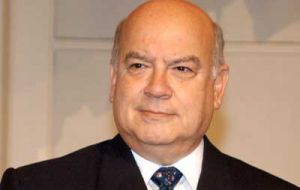MercoPress. South Atlantic News Agency
Speculation about US thumbs down to Insulza’s OAS re-election
 Insulza allegedly has been accused of being too complacent with Venezuela’s Hugo Chavez
Insulza allegedly has been accused of being too complacent with Venezuela’s Hugo Chavez Chilean media reported this weekend that US Secretary of State Hillary Clinton has twice stated to Chile’s government that the US will not support the re-election in 2010 of Chile’s José Miguel Insulza to head the Organization of American States (OAS).
Insulza, a former Chilean Interior Minister, apparently rubbed the US the wrong way following his leadership role in the OAS’s decision to readmit Cuba to the organization. Cuba was removed from the OAS in 1962 last June.
The US wanted stricter regulations to be imposed on Cuba to assure greater democracy in the country. Clinton was reportedly unhappy with Insulza’s personal attempts to get Cuba unconditionally reinstated.
Insulza’s position was further undermined by Clinton’s naming Costa Rican President and Nobel Prize winner Óscar Arias as the sole negotiator in the Honduran crisis, (July 9), ignoring Insulza’s efforts, reported Chile’s conservative media this weekend.
Insulza has been criticized by a range of (mostly right of centre) US think-tanks for allegedly being too close to Venezuelan President Hugo Chávez. Many of Insulza’s policies within the OAS dovetail with those espoused by Chavez’s Bolivarian Alliance for the Americas (ALBA), say the critics.
ALBA is a left of centre organization promoting international cooperation between Latin American and Caribbean nations and was initially proposed by Chávez as an alternative to the failed Free Trade Area of the Americas proposed by the US.
“Insulza has been a loyal disciple of Chávez in the case of Honduras,” said Juan Carlos Hidalgo, Latin America project coordinator for US think tank the Cato Institute.
“It is obvious that if Insulza wants to be re-elected, he has to be on good terms with Chávez, who with Petrocaribe [an oil alliance between Venezuela and the Caribbean] has about 14 or 15 votes in the OAS. In Washington there is growing concern over the secretary general’s biased actions”.
Insulza has also been criticized for not intervening with the same intensity for democracy violations alleged in Venezuela, Nicaragua, and Bolivia, as he has shown in Honduras.
The conservative El Mercurio highlighted a letter recently sent to Insulza by Henry Ramos Allup, leader of the Venezuelan opposition party Democratic Action. It said: “Dear Secretary General of the OAS, don’t act stupidly; we know you know what is happening in Venezuela. You should be ashamed: don’t turn into the tyrant’s [Chávez’s] spokesman.”
“Insulza’s inflexible defence of Zelaya and his lethargy with regard to political rights being trodden down in half a dozen other countries have only one thing in common: it is what Chávez wants,” said Roger Noriega, ex US Under-secretary of state for Western Hemisphere Affairs during the George W. Bush presidency.
Insulza has referred to alleged violations of democratic processes in countries such as Nicaragua and Bolivia as “internal problems,” and has denied being inflexible or a socialist “ideologist” with regard to the crisis in Honduras.
“I have received this kind of criticism for all the problems I’ve dealt with in the OAS” Insulza told El Mercurio last week. “However, I don’t feel my position as secretary general has come under threat, so this has not been my concern.”
Insulza was nicknamed “Insulso” (“dull”) and called a “jerk” by Chávez in January 2007 following the former decision to ask Venezuela to reinstate cable television network RCTV, whose license was not renewed by the Venezuelan government following accusations of its involvement in a short-lived coup in 2002.
By Chris Noyce (ST, Jan. 10 2007).




Top Comments
Disclaimer & comment rules-

-

Read all commentsGiven the absolute foreign policy disasters the Bush administration was responsible for and the abysmal record of the right in Latin America historically, why does anyone still pay any attention to what people like Roger Noriega and his ilk have to say? Furthermore, there is a very good reason why “El Mercurio” is known in Chile as 'el diario de las mentiras” given its long time promotion of the Pinochet dictatorship and its failure to report what was actually happening internally in the country during those 18 years.
Jul 14th, 2009 - 01:11 pm 0Insulza is a very dangerous mind.
Jul 14th, 2009 - 06:05 pm 0Commenting for this story is now closed.
If you have a Facebook account, become a fan and comment on our Facebook Page!